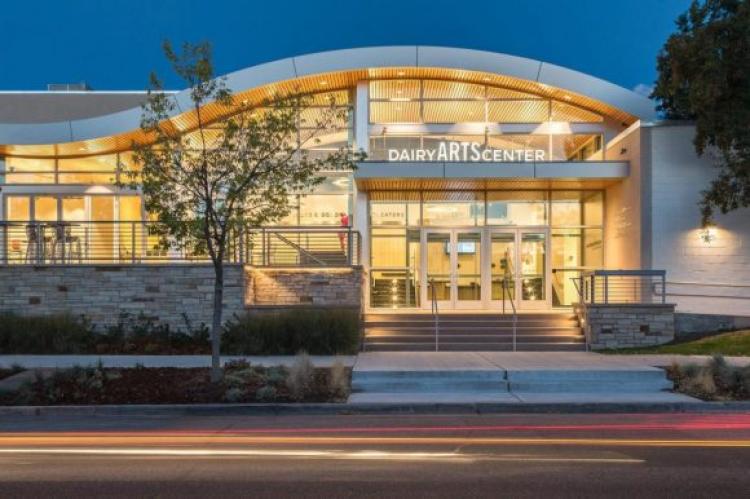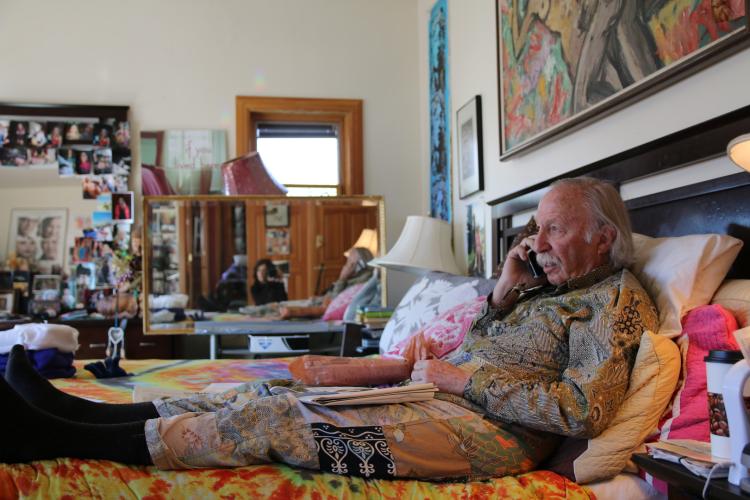Documentary film festival celebrates dynamic voices
The Mimesis Documentary Festival will showcase international documentary and ethnographic film works from more than 80 artists at the Dairy Arts Center and the ATLAS Institute from Aug. 4 to 10.

At the top of the page: Mimesis Documentary Festival logo by Mimesis Documentary Festival associates. Above: The Dairy Arts Center in Boulder, Colorado. Image provided by Mimesis Documentary Festival associates.
An international showcase of documentary and ethnographic media is coming to Boulder in the second annual Mimesis Documentary Festival from Aug. 4 to 10.
The 2021 Mimesis Documentary Festival features the work of more than 80 artists, producers and scholars from around the world. The six-day festival is a nonprofit project of the University of Colorado Boulder’s Center for Documentary and Ethnographic Media and will exhibits a collection of screenings, installation-based documentary art pieces, workshops and conversations with, “some of the most dynamic voices in documentary and ethnographic film,” a press release states.

Screen capture from Pedro Costa's Vitalina Varela. Image provided by Mimesis Documentary Festival associates.
The festival is a hybrid experience, allowing audiences to view the films virtually or in person. Special events will be presented in-person only at Boulder’s Dairy Arts Center and the ATLAS Institute B2 Center for Media, Arts and Performance, but most programs can be viewed virtually.

Screen capture from Lynne Sachs's Flim About a Father Who. Image provided by Mimesis Documentary Festival associates.
Tickets can be purchased on the Mimesis website. For CU Boulder students, the committee has reserved 130 tickets for physical events and 110 for virtual events, so some students can attend for free.
“Most everything will be available virtually and in-person,” said festival director Curt Heiner. “We try to do a one-to-one model where you can see something virtually and then have at least one in-person program as well. The virtual events will be available on-demand whenever you want to watch them.”
One event that can be viewed only in-person is Featured Artist Pedro Costa’s editing masterclass. The masterclass will review his documentary Where Does Your Hidden Smile Lie? on Aug. 8 at 10 a.m. There will also be a screening of his critically acclaimed, Vitalina Varela on Aug. 6 at 7:15 p.m..
“We’ve been trying to get more people to submit to a docufiction category, things that can span multiple genres,” Heiner said. “This is the kind of category that Pedro Costa has become synonymous with in a lot of ways. His type of filmmaking really does come off in a more narrative sense, but there is a big push for a lot of his characters that are constantly playing themselves across multiple movies and scripts.”
Lynne Sachs is the opening night artist with her piece Film About a Father Who on Aug. 4 at 6 p.m. This film was one of the outstanding works from the open submissions. Following the opening night screening, the Dairy Arts Center will host a party in the lobby with a DJ and light refreshments.
“I can’t wait to see it,” said Eric Coombs Esmail, director of the Center for Documentary and Ethnographic Media and instructor of critical media practices. “Her work is something that has been critically lauded. The program team was blown away by it.”
The program team reviewed submissions from places like the United Kingdom, India, China, Germany and Switzerland. Of the open submissions, 80% will be screened and range from genres such as traditional, ethnographic, docufiction, experimental and emerging or student categories.
“It is a brutally long, intensive review process, and every piece is watched more than once by more than one of our main programming team,” Esmail said. “Every single project is debated and viewed by multiple people. The way that these are programmed, it’s not just the quality of the film itself, but also for how they fit into the rest of the films that are submitted.”
Throughout the week there will be conversations with moderated artists and a screening curated in partnership with the Flaherty media arts organization.
The Mimesis Documentary Festival aims to elevate foster artists and promote transparency and inclusion and “to help secure and promote Colorado’s place in a local, regional and international community of nonfiction creators and scholars,” the press release stated.
The festival is supported by funding from the departments of anthropology and critical media practices, the College of Media, Communication and Information, the Research and Innovation Office at CU Boulder, and the Stewart Family Foundation. This funding helps creators around the world have their work on display.
Esmail said, “I can’t wait to see what comes and see the kind of community we’ve got. It’s going to be the first time that we’re all together in-person for this festival. I’m especially excited to see the community of artists that might come together.”
More information on the Mimesis Documentary Festival is available on the Mimesis website.

